APL announced on 20th October that it was launching a new Korea China Straits (KCS) service to serve the key Asian markets of China, Korea, Singapore, Malaysia, Indonesia and the Philippines on 18th November. The first weekly southbound sailing departed from Dalian with a port rotation of Dalian, Xingang, Lianyungang, Kwangyang, Pusan, Shanghai, Nansha, Singapore, Port Klang, Jakarta, Surabaya and Manila. The KCS service will reinforce APL’s footprint in Intra-Asia where the carrier seeks to fortify its presence as a leading ocean carrier. The offering injects new capacity that allows APL to transport shipments from North Asia to its network of ports across Southeast Asia. The service will be operated with five Panamax vessels through a Vessel Sharing Agreement with Cheng Lie Navigation. APL declared on 8th November the enhancement of five Asia-India Subcontinent services. A faster turnaround and transit time will characterise the enhanced route profiles. In particular, the Asia Subcontinent Express (AS1) service is being revamped into two services, AS1 and Asia Subcontinent Express 3 (AS3). This will shorten the current 49-day round trip of the AS1 service to 42 days while the AS3 service will cover its loop in 35 days. On 5th December APL commenced new CP1 and CP2 services from Hong Kong with a CP3 service commencing prior to this from Yantian on 23rd November. The three new weekly China-Philippines Loop services enhance APL’s coverage between South China and the Philippines.
CMA CGM revealed on 19th October that it planned to launch the Mtwara Express Service for the Tanzanian cashew season on 1st November, complementing to the 6 current direct East Africa services. Fully operated by CMA CGM Group, the service used 3 vessels up to 2,700 TEU nominal capacity with departures on 1st/15th/29th November. CMA CGM chartered the 89,097gt/2005 built 8,063 TEU capacity OOCL Tianjin from Global Ship Lease, renamed as the GSL Tianjin, as from 25th October for 8 months. GSL acquired the OOCL Tianjin from OOCL for $55m in 2014 on a 3-year charter back deal. CMA CGM has also acquired two 6,500-TEU vessels from Germany’s Hansa Treuhand. The ships are the 75,015gt/2012 built HS Paris & 75,015gt/2014 built HS Rome. Both vessels are already operated by CMA CGM via a charter agreement and, when acquired, the HS Rome was sailing on the OCEAN Alliance Victory Bridge service and the HS Paris is sailing on the North Europe/ South Med service jointly operated by Hamburg Sud, Seago Line and CMA CGM.
Cool Carriers will bring its Coolman Central America and West Indies service to Dover Cargo Terminal for onward distribution to UK and European markets from January 2018. The company, which has invested heavily in boosting both the palletised and container capacities of its fleet, says its decision was prompted in part by the Port’s flagship Dover Western Docks Revival project which will create a new cargo terminal and logistics hub plus the requirements for the efficient handling of the new vessels which will enter service in early 2020. Cool Carriers will predominantly ship bananas and pineapples from Costa Rica, Colombia and the Dominican Republic to Dover. The port’s current facilities include a dedicated berth in excess of 180m, 130 reefer plug-in points, and temperature controlled storage for 7,500 pallets. The new facilities in the western docks, due to come on stream towards the end of 2018, will include two new cargo berths (251m and up to 350m); a cargo terminal building with eight temperature controlled compartments, each capable of holding cargo between +1 and +14 degrees Celsius; and significant mobile harbour cranes capable of handling up to post panama size vessels.
Evergreen has joined Cosco and Yang Ming to boost the Northern Europe-Mediterranean services by way of a new Europe-Med Express (EMX) service. The route utilises five ships of 4,250 TEU capacity, one provided by Evergreen and YML respectively and the remaining three by Cosco. The first departure was from Rotterdam on 27th November and the port rotation is: Rotterdam-Felixstowe- Hamburg-Antwerp-Casablanca-Piraeus-Alexandria-Haifa-Mersin-Piraeus-Casablanca and Rotterdam. The service allows Evergreen to provide a direct connection from northern Europe to the Mediterranean, particularly to and from Morocco, Turkey, Israel and Egypt.
Hamburg Süd announced on 18th October that it was launching a weekly, direct service from Peru’s Port of Paita to Philadelphia with a transit time of nine days to provide exporters in Peru and US importers with a service to directly ship such sensitive cargoes. The operation began in November and concluded in February 2018.
Hyundai Merchant Marine (HMM) is also reportedly considering placing an order in March 2018 for 20,000 TEU ships to boost competitiveness against its larger peers. Delivery would be scheduled for 2021. The largest ships in the fleet are currently of 13,000 TEU.
Maersk Line’s 141,716gt/2011 built Maersk Evora (above) achieved a new world record at APM Terminals’ Pier 400 in Los Angeles on 17th October. The 366m long ship arrived carrying only nine containers above deck and managed to load and unload a total of 24,846 TEUs during her call, departing again on 22nd October bound for Yokohama, Japan, where she arrived on 7th November.
Meanwhile the Triple E vessel Milan Maersk has become the largest container ship to call at Colombo Port in Sri Lanka, or indeed any port in South Asia. On 7th November A.P. Møller-Mærsk A/S announced that, during the third quarter of 2017, continuing operations increased by 14% year on year driven by higher freight rates in Maersk Line. The underlying profit was $248 million, with an improvement of $290m in Transport & Logistics and a decline of $15 million in Energy.
On 8th November the Port of Southampton welcomed their largest container ship yet, in the form of the 214,286gt/2017 built and 20,568 TEU capacity Milan Maersk (above). The ship’s capacity exceeds that of the previous largest visitors, the 210,678gt/2017 built MOL Triumph and MOL Trust by almost 400 TEU. The vessel will be calling at Southampton as part of the AE1 service of the 2M alliance which connects Mainland China & Hong Kong to European & North Africa ports. The Milan Maersk’s arrival almost didn’t happen due to delays caused by the late departure of the 153,148gt/ 2015 built Salahuddin from Southampton. The ship then only called to discharge only so as to minimise the delay. Containers not collected by the Milan Maersk were picked up by the 52,726gt/2010 built Barbara on a following call.
During the third quarter of this year, Maersk Line recycled three ships and took delivery of two out of 11 second-generation Triple-E vessels and three out of nine 15,2000 TEU capacity vessels ordered in 2015. The 31,333gt/1998 built Sub-Panamax containership Maersk Pembroke has been sold for green recycling to a yard in Turkey following a fire in an auxiliary engine on 22nd August while the ship was sailing some 125 nautical miles South West of Ireland.
MOL’s brand new 210,678gt/2017 built MOL Truth (above) was named on 25th October at Imabari Shipbuilding’s Saijo yard in Japan, the first of two vessel giants ordered by Mitsui OSK Lines (MOL) in early 2015 as part of a deal for six 20,000 TEU containerships, with two of them assigned to Imabari and the remaining four to South Korea’s Samsung Heavy Industries (SHI). Delivered on 31st October, the MOL Truth is the fifth in a series of six 20,000+ TEU vessels and will be deployed in THE Alliance’s Asia- Northern Europe service. The MOL Truth is the first Japanese built 20,000 TEU containership and also the first to carry the Panamanian flag.

MPC Container Ships AS of Norway has entered into an agreement to acquire the 16,162gt/2008 built HS Liszt (above), a 1,350 TEU capacity vessel, from Hansa Treuhand KG in November. The ship will be renamed AS Filippa. Also joining the MPC Container Ships fleet that month were the 2,564 TEU capacity/2008 built AS Petulia and the 1,200 TEU capacity/2003 built AS Frida. These purchases bring the company’s fleet to 26 ships, not bad for a company only formed in April 2017.
MSC’s six new 22,000 TEU capacity containerships that the company ordered at Samsung Heavy Industries (SHI) in late September have been revised downwards in cost from $164m per ship to $138m. The initial price apparently included propulsion options that appear to no longer be part of the deal, including LNG technology. The ships are all scheduled for delivery by December 2019 and are in addition to orders for five ships of the same size placed with Daewoo Shipbuilding & Marine Engineering (DSME). The DSME ships do still come with LNG propelled engines. More recent reports infer that the capacity of these 402m long goliaths will most likely be 23,356 TEU. Meanwhile, CMA CGM has ordered nine 22,000 TEU ships in China, all to be equipped with LNG-fuelled engines.
Navios Maritime Containers is acquiring two 2009-built 4,250 TEU capacity containerships to take its fleet to a total of 16 vessels. The ships were expected to be delivered to Navios Maritime in November. Their identities were not disclosed but reports suggested that the duo were from the former Rickmers trio, namely the 40,452gt/2009 built Milano, 40,541gt/2010 built Spirit of Lisbon & the 40,452gt/2009 built Tanja Rickmers. Navios is paying a total of $19.75m for the pair, and expects to have them delivered into its fleet in early November.
OOCL launched a new China Pakistan Express 2 (CPX2) loop, commencing from Shanghai on 12th December with the following port rotation, Shanghai-Ningbo-Xiamen-Singapore-Karachi-Shanghai. The CPX2 offers direct services from Xiamen to Karachi as well as Karachi to Shanghai with competitive transit times. The new 210,890gt/2017 built OOCL United Kingdom arrived at Felixstowe on her maiden voyage on 9th November (above).
Pelni of Indonesia, a state-owned operator, is to spend $37 million on purchasing six second hand feeder container vessels in support of President Joko Widodo’s maritime highway scheme. Four of the ships are expected to be delivered late this year while the final two will be delivered in early 2018. The self-geared vessels are all under 10 years old and have capacities ranging from 200-400 TEU.
Pacific International Lines (PIL) Group, a Singapore based containership operator, took delivery of two new 113,976gt and 11,800 TEU container ships on 26th October from the Suzhou Shipyard of Yangzijiang Shipbuilding (Holdings) Ltd. The two vessels are among the fleet of 12 ships ordered by PIL and have been christened Kota Pahlawan and Kota Panjang. Both successfully completed their sea trials departed for Singapore on 30th October and 1st November respectively. The two vessels were deployed on the Far East-U.S.A AC5 service from the beginning of November 2017, calling at Xiamen-Nansha-Hong Kong-Yantian-Long Beach-Xiamen.
Port of Rotterdam continues to increase container throughput and, in the first nine months of 2017, the volume of containers handled increased by 10.1% compared to the corresponding period in 2016, to a total of 10.2 million units (TEU). The port’s total throughput in that same period increased by 2%. In addition to containers, the key contributors to this overall growth were the agribulk and breakbulk segments. The port recorded a drop in the throughput of liquid bulk like mineral oil products. A total of 351.5 million tonnes was handled in the period until the end of September.
Regional Container Lines of Thailand has ordered two 172m long and 1,668 TEU capacity containerships at Jiangsu New Yangzi Shipbuilding, one of the subsidiary shipyards of Chinese shipbuilding group Yangzijiang Shipbuilding. The vessels will replace existing elderly tonnage. RCL’s fleet comprises more than 20 containerships with capacities ranging from 189 to 6,621 TEU. In addition, the company has four 1,688 TEU ships on order at Jiangsu shipyard, two of them scheduled for delivery in 2017 and two in 2018.
SCA Logistics trialled the 25,715gt/2016 built and 1,900 TEU capacity Delphis Bothnia (above) at Umea and Sundsvall on sailings from Rotterdam in the summer of 2017 whilst the regular 11,746gt/2012 built and 1,100 TEU capacity container vessel SCA Tunadal underwent planned maintenance. The vital trial enabled SCA to evaluate the use of a larger ship on its container service for as and when greater capacity becomes necessary.
Seaspan Corporation is set to acquire via bareboat charter five 11,000 TEU capacity containerships. Funding for this has been secured via subsidiaries of CMB Financial Leasing (CMBFL). The vessels are being built by Hanjin Heavy Industries and Construction Philippines.
Wessels Reederei has signed a letter of intent with compatriot engine manufacturer MAN Diesel & Turbo to convert three more of its ships to dual-fuel gas operation. The trio are sisters to the Wes Amelie (above), a 1,036 TEU capacity feeder ship with a MAN 8L48/60B engine that was retrofitted to a multi-fuel, 4-stroke MAN 51/60DF unit earlier in 2017. This enables dual-fuel operation and was the first such conversion of its type the world has ever seen.


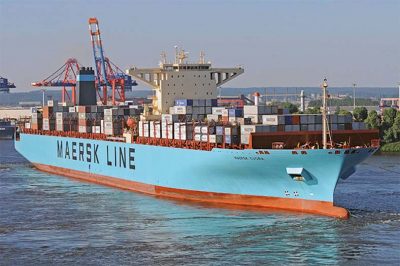
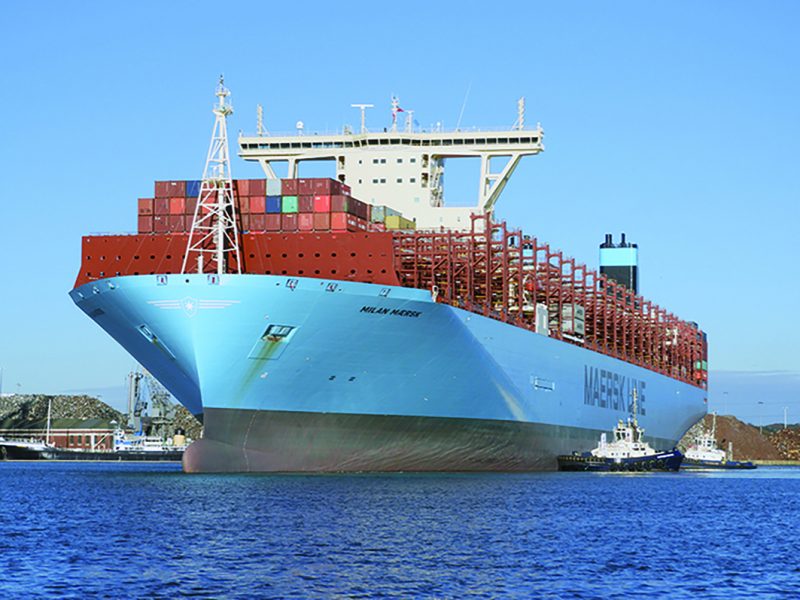
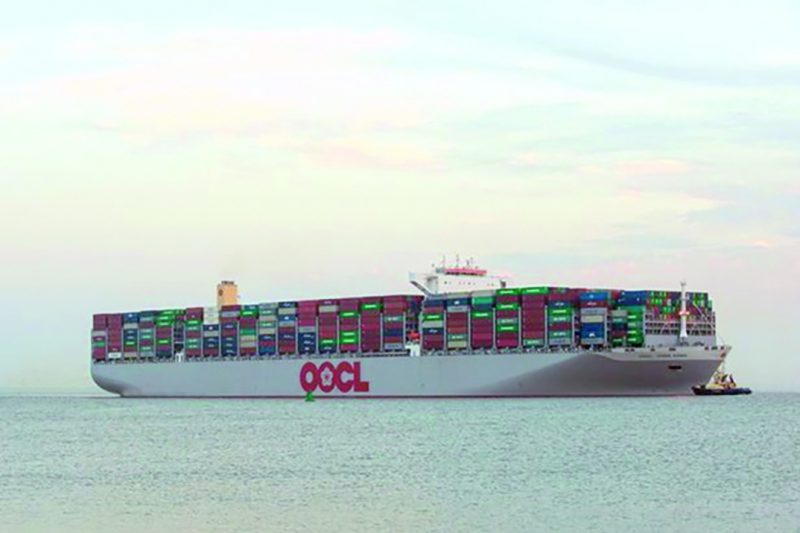
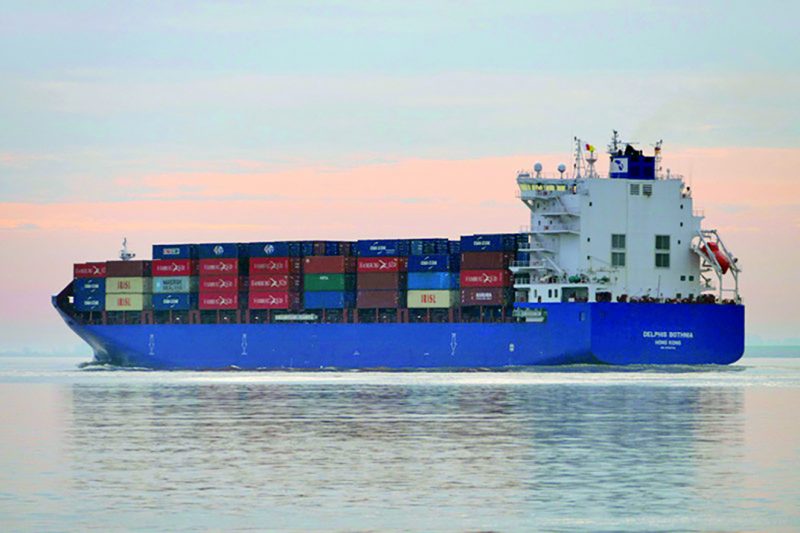
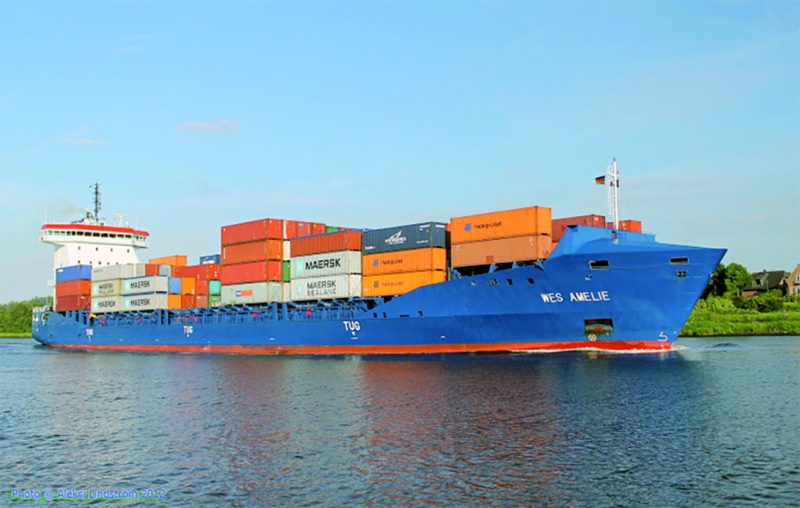
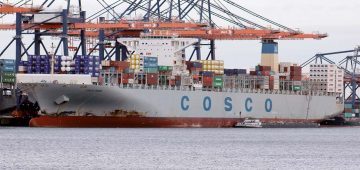



Comments
Sorry, comments are closed for this item